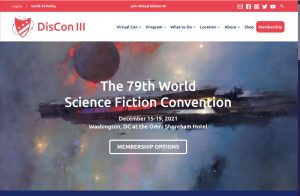This weekend is this year’s World Science Fiction Convention, in Washington D.C., and again I am not attending, as I have not attended any conventions at all since when Worldcon was near me, in San Jose, in 2018. Tonight, beginning at 6pm PST, the Hugo Awards winners will be announced.
The first thing to note about this year’s Worldcon is how late in the year it is being held. Worldcon is usually held around Labor Day Weekend, in the US, or sometimes in August, as when the the convention is held in other countries. (It is, after all, a “world” con.) I believe the planners of this year’s convention decided early on to move the convention as far out in the calendar as possible, to hope that the Covid pandemic would have died off. It hasn’t, and so I think many people who did plan to attend canceled at the last minute, especially due to Omicron. Still, from reports on Facebook, apparently a fair number of people are there.
The second thing to note is that the Worldcon has been losing some of its legitimacy in recent years, ever since the “Sad Puppies” cabal of right-wing writers and fans stuffed the ballot boxes of the Hugos (by buying memberships; that’s all it takes; anyone can) several years ago, resulting several winners of the awards (voted upon by all members, not just nominators), going to “No Award”. (See Hugo Awards 2015.) The Puppies gave up and founded the Dragon Awards instead; these are hosted by a Comic Con-like convention and require no memberships at all to nominate. Their nominees are mostly, if not entirely, populist and conservative writers, especially those published by Baen Books, the leading publisher of military science fiction.
Other factors have ensued. The Hugo nominations have become increasingly “woke,” if that’s the term to use, in that nominations reflect the diversity of the readership perhaps moreso than anything. This year, for example, is the third year in a row that all the nominees in the Novel category have been written by women. Not that there’s anything wrong with that. But some of the younger writers, especially those of color, have been vocally dismissing the early writers and editors of science fiction as old white men as irrelevant, if not perhaps actually fascists. Without going into details, this has resulted in the author Robert Silverberg, who had been attending every single Worldcon in a row for over 50 years, to decline to attend this one.
Times change.
The most notable development so far at this year’s convention is the results of the vote for where the convention will be held in two years. (These votes are always held two years before the event.) This year apparently quite a number of Chinese voters bought membership specially to vote the 2023 convention to be held in Chengdu, and they won handily. This has upset a number of American fans, who object to China’s human rights issue, and who are now speculating on what kind of alternate convention might be held in the US.
will update this a bit later…. — Update 19dec21: will do another post about this; but endpiece below updated tonight.
Endpiece
I finished updating the sfadb.com site with several new anthologies, and along the way refined my “desk instructions” in the hope that someone else, given all my database files, could repeat the process. Though I don’t really expect this to happen.
A case in point is William (Bill) Contento, who died this past week. He was a lifelong engineer for some firm out in Livermore, but he was a science fiction fan and knew Charles N. Brown from way back. He created databases that used text file inputs to create text file outputs that he uploaded as .html files. He created the “Locus Index to Science Fiction,” built on compiling the contents of the anthologies and short story collections received by Locus. And he did similar bibliographies for mysteries.
He was several years older than me, in his 70s, and he hadn’t actually updated any of his indexes in a decade. (I have a CD ROM copy of the last, 2012, update of his “Locus Index to Science Fiction”.) Did he leave instructions for anyone to take over? Not that I know of. There was discussion on Fictionmags of his life and work.
Yet time moves on, and old methods and products give way to new ones. Over the past decade the Internet Science Fiction Database (http://www.isfdb.org/) has expanded and become greatly more authoritative than it was in its early years (when to me it seemed rife with errors), and frankly it now fulfills the function that Bill’s Indexes for science fiction once did.
Meanwhile I’ve been documenting with “desk instructions” all the steps to maintain my sfadb.com index to science fiction awards. But if no one does, will anyone care? Back to isfdb — it compiles quite a few awards, including some I haven’t. So the data is there. My issue with isfdb has always been I don’t like its layout, and it provides nothing like my sfadb pages that list author results in various ways, and awards results in various ways. (I had that issue with Bill’s databases too.) In fact, I squint in skepticism over a page like this, http://www.isfdb.org/cgi-bin/ay.cgi?69+2020, that compiles much too much information than anyone needs to know — and obscures the relevant information, about who exactly won. Well, different tastes etc.






